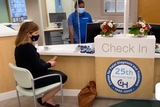Prenatal Genetic Counseling in a Fetal Center
At the Richard D. Wood Jr. Center for Fetal Diagnosis and Treatment (CFDT), we have six full-time prenatal genetic counselors dedicated only to fetal patients, making us one of the most robust teams in a fetal center in the nation. These specialists collaborate with families to understand their needs and values, assess risk factors, facilitate genetic testing, and advocate for an answer to their prenatal diagnosis.
Our prenatal genetic counselors are dedicated to providing as many answers as possible to families’ questions. We see information as power, and we are honored to be a piece of the puzzle, helping empower families for both current and future pregnancies.
What to expect when you meet with a prenatal genetic counselor
Prenatal genetic counselors are core members of the multidisciplinary team that meets with every patient on the first day of their comprehensive evaluation at the CFDT.
Before meeting with families, our prenatal genetic counselors carefully evaluate a patient’s medical record to predict what education, support and genetic testing they may need based on their individual case. Oftentimes, this includes doing hours of research on a patient's individual diagnosis. Other times, it can mean determining what testing a patient may benefit from and contacting insurance companies to find solutions to any financial barriers to testing.
When our prenatal genetic counselors meet with patients, they may discuss screening and testing options that are available for the family to figure out the cause for the reason they were referred to the center. Counselors seek to empower families to think about when and how learning genetic information feels best for them.

Tour our Fetal Center
The Wood Center for Fetal Diagnosis and Treatment has cared for many families and will help you through your journey, too.
Detailed genetic testing and counseling
Our team discusses diagnostic genetic testing as a standard of care for any fetus with a structural anomaly.
Our team can review any existing genetic screenings and answer questions about them. We provide a deeper level of evaluation that can guide next steps and point us toward more detailed tests. We will recommend any additional genetic testing that is available for each individual family, and discuss the benefits, risks and limitations of each test.
Procedures patients may undergo for genetic testing include:
- Amniocentesis
- Chorionic villus sampling
- Amnioreduction
- Thoracentesis
- Vesicocentesis
- Percutaneous umbilical cord blood sampling
The level of prenatal genetic testing we offer patients has evolved greatly thanks to improvements in technology. Because of our expertise with fetal anomalies, our counselors have been able to partner with labs across the country to ensure the most comprehensive testing is available for our patients in the prenatal setting.
Genetic tests we offer include:
- Karyotype
- Chromosome microarray analysis
- Single gene sequencing and deletion/duplication analysis
- Whole genome or whole exome sequencing
- Panel tests for specific diagnoses
- Prenatal UPD (uniparental disomy) testing - used to identify cases where a fetus has inherited both copies of a chromosome from one parent and none from the other
High diagnostic rate and how that helps our patients plan
Our team has helped thousands of families through genetic testing since we opened in 1995. For example, we have ordered hundreds of whole exome sequencing tests and more than 40 whole genome sequencing tests since 2015.
Based upon data from our cohort, we have a 40% diagnostic rate from our testing, compared to an 10-20% diagnostic rate published by other providers utilizing this same testing technology in the prenatal patient population.
Advances in prenatal genetic counseling
Providing the answers to families’ questions and helping empower them for the future is the greatest gift we can give families.
Our success with pinpointing a genetic diagnosis is a result of:
- The expertise in genetics and dedication of our team
- Our expertise in imaging, which allows deeper phenotyping
- Our continuity of care with neonatology and clinical genetics
This has led to the discovery of seven novel genotype/phenotype correlations and the publication of findings from more than 30 research studies.
Our prenatal genetic counseling stats since 1995: 16,986genetic tests sent 87national and international talks given31papers published7novel genes unveiled Genetic counseling since the CFDT opened in 1995.
Using test results, our prenatal genetic counselors partner closely with our maternal-fetal medicine (MFM) specialists to create a plan of care for our families. This helps us comfort and prepare families, determine next steps, strategize clinical prevention measures, and discuss potential treatment options.
One of our team members, Nahla Khalek, MD, MPH is among the less than 100 clinicians in the country to be triple board certified in Maternal-Fetal Medicine, Obstetrics & Gynecology and Clinical Genetics, with additional years of training in each of those specialty areas.
Once a patient, always a patient
Our team strongly believes that once someone is a CFDT patient, they are always a CFDT patient. Our genetic counselors follow families regardless of whether they continue care at CHOP. We help patients navigate their next pregnancy, which may include:
- Establishing psychosocial resources
- Facilitating the process of pre-implantation genetic diagnosis
- First and second trimester diagnostic testing
Our prenatal genetic counseling stats since 1995:
16,986
genetic tests sent
87
national and international talks given
31
papers published
7
novel genes unveiled
Genetic counseling since the CFDT opened in 1995.